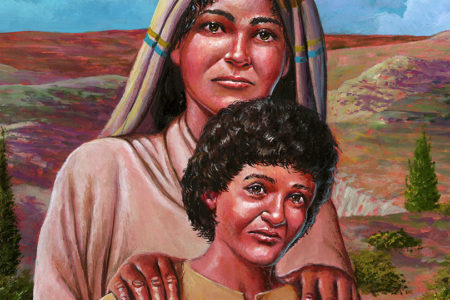“O Come, O Come, Immanuel”
Whether he understood the proper context of his words or not, the 12th-century hymn writer captured the mood of a remnant of Jewry who were longing for the appearance of the Christ. Theirs was a time when national dreams had faded and personal aspirations were being suppressed by tyrannical Rome. Her emissary, Herod the Great, was a man given to seducing Jewish youth for paganism and crushing those who stood in the way of his personal ambitions.
Judaism was fragmented by haggling internal factions, its true teachings obscured by mountains of religious minutiae created by teachers who had missed the point of what Jehovah was doing among His people.
In a word, theirs was an impoverished world. Rome had bled them dry materially; religious leaders had served them badly spiritually. It was an era when there was no voice of the prophet in the land, and anguished hearts rang with Jeremiah’s haunting words, “Is it nothing to you, all ye that pass by? Behold, and see if there be any sorrow like unto my sorrow” (Lam. 1:12). It was truly a time for hanging on in the hope that the silence would one day be broken. The voice of God would soon be heard in the sound of an infant’s cry. Deity was about to invade humanity.
Divine intentions for the incarnation had not been obscured in the Old Testament Scriptures. With the canon closed and four hundred “silent years” between, Jewry had ample time to analyze the elements attendant to His entrance into time.
The wonder of the process was reflected in its simplicity. Incarnation, the greatest single creative act since the birth of humanity, was couched in terms and displayed in events that would allow the simplest among them to observe, verify, and settle in their own minds what had transpired in the coming of the Messiah.
Prophetic passages trumpeting the hope of Israel—Messiah’s birth—graced the pages of the sacred volume. Distilled, they revealed the place, person, and prospects flowing to Jewry and mankind through the incarnation. God would step into time, but not majestically, on a cloud, as some believed. He would gain entrance in the humblest of ways. Israel’s hope would be “born of a woman.”
“Therefore the Lord himself shall give you a sign; Behold, the virgin shall conceive, and bear a son … ” (Isa. 7:14a).
Israel was a nation preoccupied with searching for signs from God. Isaiah’s words placed before the people the first of Israel’s three premier signs regarding the Messiah. Virgin birth was the first. Resurrection was to be the second (Jn. 2:18–22). The second coming would be the third (Mt. 24:30).
The Place
Mary, a virgin Jewess from an obscure village (Nazareth) in the Galilean hill country, would deliver the infant who was miraculously conceived within her womb by the Holy Spirit.
Bethlehem Judah would be the place of His birth. “But thou, Bethlehem Ephrathah, though thou be little among the thousands of Judah, yet out of thee shall he come forth unto me that is to be ruler in Israel, whose goings forth have been from of old, from everlasting” (Mic. 5:2).
The Person—Who Would He Be?
Judaism held sundry positions on the identity of the Messiah. Generally, rabbis agreed, “The Messiah was expected to attain for Israel the idyllic blessings of the prophets he was to defeat the enemies of Israel, restore the people to the Land, reconcile them to God, and introduce a period of spiritual and physical bliss. He was to be a prophet, warrior, judge, king, and teacher of Torah. However, the Messiah was always the agent of God and never a savior in the Christian sense.” In other words, the Messiah would be everything except the divine Son of God.
Isaiah’s inspired revelation put the matter to rest. Mary’s “son” would be the Son of God: “ … and shall call his name Immanuel [God with us]” (Isa. 7:14b).
The Purpose of His Coming
Why was He coming? When princes are born to great earthly kingdoms, people rejoice and hail their future kings. And when they ascend to the throne and are crowned, their subjects return to palace squares and city streets to cheer their monarchs. These are acts of expectation—exhibitions of hope for the future, hope that their sovereigns will bring peace, stability, security, and an abundant life for themselves and their posterity. That’s what cheering for human princes and kings is all about.
No earthly king or queen has ever been able to fully meet those expectations. All have been flawed with imperfections common to man. So the cry countries to be heard. It was, and is, in ways even they do not understand, most urgently raised by the Jewish people who have suffered so much. Thus the haunting refrain draws us to it and compels us to breathe in its spirit. “O come, O come, Immanuel, And ransom captive Israel, That mourns in lonely exile here Until the Son of God appear … ”
But He did come! He was among us. And He is coming again!
Jehovah’s purpose in the Messiah was never intended to be missed or hidden.
For unto us a child is born, unto us a son is given, and the government shall be upon his shoulder; and his name shall be called Wonderful, Counselor, The Mighty God, The Everlasting Father, The Prince of Peace. Of the increase of his government and peace there shall be no end, upon the throne of David, and upon his kingdom, to order it, and to establish it with justice and with righteousness from henceforth even forever. The zeal of the Lord of hosts will perform this (Isa. 9:6–7).
The words are crystal clear, the intent is precisely articulated, the benefits accruing to His people are assured—Israel’s, and humanity’s, hope was to be realized at last. But, “his own received him not” (Jn. 1:11). It is a failing all too often exhibited by frail humanity. They looked to the wrong quarter and listened to the wrong leaders—leaders who placed their own interests above the counsels of the King and the needs of the people.
However, the same gracious God who initiated the incarnation for the purpose of bringing Israel’s divine Son of David into the world extended grace far beyond man’s folly. He gave His King to us all. “And the angel said unto them, Fear not; for, behold, I bring you good tidings of great joy, which shall be to all people. For unto you is born this day in the city of David a Savior, who is Christ the Lord” (Lk. 2:10–11).
Israel’s kingdom was temporarily set aside in order for grace greater than our sins to prevail. If the incarnation was an inexplicable act of condescension by the omnipotent God, the awe-inspiring scope of it became comprehensible in the fact that the incarnate Christ can now enter every human speck of dust found on this planet. The gateway is found in a reality as astounding as God’s entering time by way of a Jewish virgin’s womb. It is this: By self-limiting Himself to a body of flesh, blood, and bone, it became possible for God to die as a sacrifice for those who had rebelled against Him. Isaiah 53 said He would. The psalmist filled in the details (Ps. 22). Still, so staggering is the entire concept that the human mind cannot begin to take it all in. It is as far beyond us as the limitless recesses of the mind of God. Those who insist on understanding it all before they accept it are doomed to failure. But the Word of God is clear concerning why Christ took on a human form:
Forasmuch, then, as the children are partakers of flesh and blood, he also himself likewise took part of the same, that through death he might destroy him that had the power of death, that is, the devil, and deliver them who, through fear of death, were all their lifetime subject to bondage (Heb. 2:14–15).
Human comprehension, therefore, comes in acknowledging and responding to the simplicity the Lord knew we needed if we were ever to be saved. This is the way He put it before us:
There is no God else beside me, a just God and a Savior; there is none beside me. Look unto me, and be saved, all the ends of the earth (Isa. 45:21–22).
For God so loved the world, that he gave his only begotten Son, that whosoever believeth in him should not perish, but have everlasting life (Jn. 3:16).
Believe on the Lord Jesus Christ, and thou shalt be saved, and thy house (Acts 16:31).
In a world more desolate, confused, and complex than prophets or first-century seekers could ever have envisioned, we must return to the first priority cry and commitment reflected in the sacred Word and the hymnist’s lyric.
O come, O come, Immanuel—You who are feeling a numbing sense of isolation in a world that doesn’t care and sin-initiated alienation from God, have hope. Your cry will be answered. It’s what the incarnation was about. He was born in order to make it possible for you and me to be born again. His life can bring us new life. “Therefore, if any man be in Christ, he is a new creation; old things are passed away; behold, all things are become new” (2 Cor. 5:17).
And ransom captive Israel—Israel’s hope of national reconciliation was never removed from the mind or program of God. For reasons known and unknown, error-prone theologians and a variety of usurpers have declared the Kingdom null and void. Thankfully, Israel’s present preservation and future expectation of a coming kingdom are not tied to humanity’s ability to deny what God has promised to His people.
Their “ransom” process has two stages: (1) Individual reconciliation through the Messiah/Redeemer as Savior. That is accomplished the moment a Jewish person trusts Christ as personal Savior. (2) The second advent coming of the King. The King will, one day soon, come.
And as we look at conditions developing around Israel in the Mideast, we understand that God alone can bring the Peace for which their hearts cry out.
But He is coming, and for the remnant of the nation that will welcome Him, His peace and Israel’s promised rest in His literal Kingdom will come with Him.
The incarnation made it all possible.






